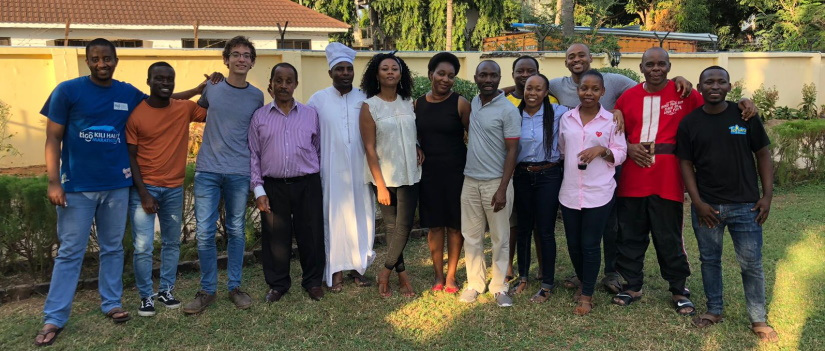October 29, 2019 | Erin Bluvas, bluvase@sc.edu
Haitian born and U.S.-educated, health promotion, education, and behavior (HPEB) assistant professor Donaldson Conserve is no stranger to international experiences. The global health researcher has traveled frequently to Haiti and Tanzania over the past few years – particularly since he launched the Self-Testing Education and Promotion (STEP) Project (i.e., a study aimed at investigating the utility of HIV self-testing) in 2016 with funding from a National Institutes of Health (NIH) Pathway to Independence Award (K99/R00).
Though Conserve’s Arnold School students have been contributing to the STEP Project from UofSC’s campus, he wanted to provide an opportunity for them to engage in the project in Tanzania. “I have been enjoying the opportunity of collaborating with the local scientists and learning more about the contexts in both Tanzania and Haiti, and I became interested in exploring opportunities to take students to these countries,” Conserve says. “However, I had no formal experience in organizing global health research opportunities for students.”
When the Study Abroad Office and Global Carolina announced their seventh International Perspectives on Higher Education trip to Colombia earlier this year, Conserve joined assistant director of global collaborations Bill Pruitt, who led the trip. The program is designed to equip UofSC faculty and staff with the knowledge they need to lead global classroom experiences. During the trip, Conserve bonded with the other UofSC faculty members who participated and learned how to establish relationships with other universities at an institutional level beyond the personal connections he had previously forged through his solo travels.
For this inaugural student trip, Conserve invited three students to gain global health research experience while working with the local team at Redsky Public Health Consulting for the STEP Project in Tanzania over the summer. To help support the students, Conserve collaborated with Pauline Jolly at the University of Alabama at Birmingham who leads the Minority Health International Research Training program. This program covered travel expenses and provided a monthly stipend and living allowance to the trainees.
One participant, Wynton Sims, is a master’s student at UAB at Birmingham. The other two were UofSC students. Noah Thompson is a biological sciences major and Magellan Scholar. Akeen Hamilton, an HPEB doctoral student who is a member of the State Doctoral Scholars, Graduate Civic Scholars and Grace Jordan McFadden Professors Programs, immersed himself in the experience.
The students attended research meetings facilitated by the Redsky team to review the study protocol and questionnaires and receive different tasks to work on to contribute to success of the project. In addition, they had a chance to visit the data collection sites with the team during the participant recruitment and enrollment process. Though the language barrier made it difficult for the students to be as involved in the participant screening and enrollment process during data collection, they found the experience rewarding and found different ways to communicate.
“We were able to observe the research process and see how field research is conducted in a global setting, which has been rewarding,” says Sims. " I feel grateful to have had the opportunity to see the data collection process in such a unique global setting."
“I was able to find other ways to engage with the people at the data collection sites," adds Thompson. "I brought a soccer ball to play with the children and young men and would walk around the as as much as I could so I could to learn more and to explore the areas."
“I befriended everyone that I could and would speak to everyone in my broken Swahili because it was now important for me to immerse myself into Tanzanian culture as much as possible,” Hamilton says. “The best things in life are shared via word of mouth and without having been open to meeting new people, I may have never been introduced to all of Tanzania’s food, culture, and sights and sounds.”
Conserve helped make the trip possible by applying what he learned in Colombia to smooth any unexpected bumps that accompany international experiences. He also drew from some of the class readings he assigned to students on how to design successful global health research partnerships during the Current Trends in Developing World Health course that he taught in during the semester prior to the trip.
As a student in the class, Hamilton was able to start working on a research paper in class related to the STEP project and continued to work on the manuscript during his time in Tanzania, allowing him to have a better context for what he was learning about the topic.
“One thing I learned from IPHE is the importance of having a dedicated team on the ground to welcome us in Colombia and having a clear plan on what was expected from us and the importance of balancing work and the downtime for us to bond and explore different sites,” says Conserve, who traveled to Tanzania prior to the students’ arrival to ensure there was a team to receive them, choose the most comfortable accommodation for their two-month stay, and plan an itinerary that would help the students complete their research project while leaving time for them to bond and plan their own activities. “The team in Tanzania not only welcomed the students and made sure they gained valuable fieldwork experience but also invited them to different social events, including a pre-wedding event for one team member’s sister, BBQs and a farewell party for the students.”
Building on these positive outcomes, Conserve is planning to bring students to Tanzania next summer as well. He hopes to develop a study abroad course so that UofSC students can earn academic credits while being exposed to research in the field. Students will have opportunities to prepare abstracts for conferences and manuscripts and develop ideas for future grants.
Related:
STEP Project’s Peer Education Program aims to promote self-testing and HIV awareness in Tanzania
Donaldson Conserve extends NIH Pathway to Independence Award into third year with R00 grant
